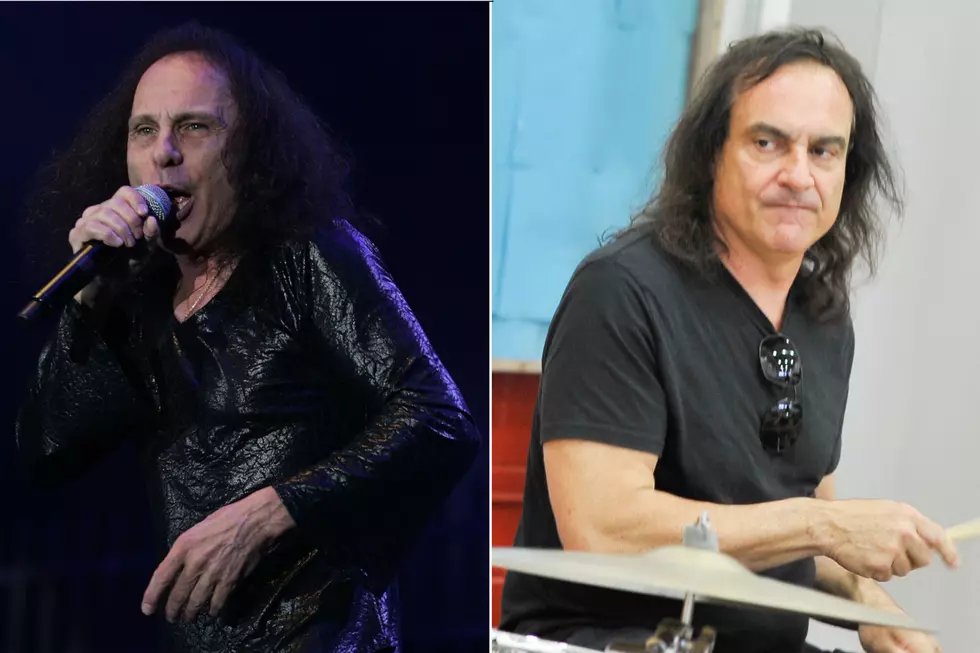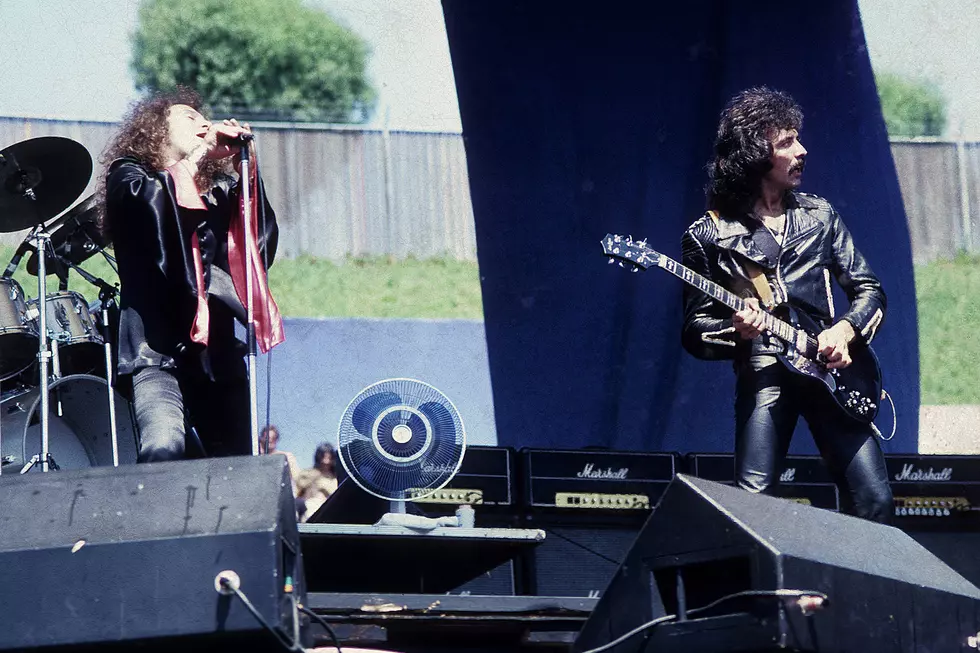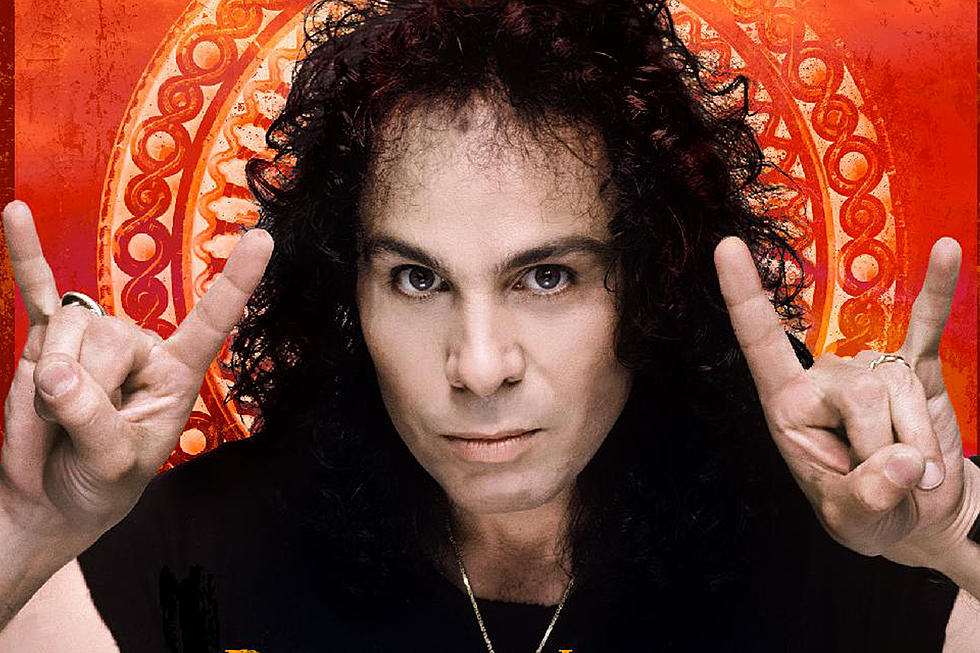Holograms in Rock: Our Writers Answer Five Big Questions
The surprise appearance of a Ronnie James Dio hologram over the weekend sparked a lot of discussion about this emerging technology. The big news here is this wasn't just a one-off idea crafted for Germany's Wacken Open Air Festival, like, say, the computer-generated Tupac's memorable turn at Coachella a few years ago. Members of Dio Disciples promise more of the hologram during a planned 2017 tour. Should they? Will this become a growing trend now in rock? Our writers gathered to sort it all out in an unfiltered roundtable discussion.
1) Do you think more and more rock artists are going to get their own holograms? Do you think people will go see these tours?
Jeff Giles: Of course they will. Remember Elvis: The Concert? You get Elvis Presley on a projection screen instead of a hologram, but the principle is the same, and that thing has been going on for decades: There were some dates earlier this year with "Elvis" being backed by a philharmonic. There's obviously a demand for it.
Matthew Wilkening: Yes, Dio will probably just be the start of the hologram trend for classic rockers. The people in charge of the estates of our biggest rock stars always seem to be looking for new ways to promote and extend their legacies, and so far the audiences seem into it.
Michael Gallucci: I don't think this will ever be a massive trend, but as long as there are popular dead rock stars, I think these things will keep popping up from time to time. But I can't see people lining for hologram tours. Break 'em out at festivals and special events. The novelty fades after a song or two.
Nick DeRiso: It seems inevitable, now that the technology is there. I honestly can't be sure, however, how these would be received over a lengthy tour. I also suspect that the novelty – really, morbid fascination, right? – would tend to wear off in an age where every concert is documented on YouTube.
2) Which artist or artists do you think will get a hologram next?
Giles: I think you need two things: a major artist whose career was defined by larger-than-life spectacle, and an estate committed to keeping said artist in front of concert audiences through any means necessary. I'm not sure how many dead rockers really fit that bill right now. I'd say it's more likely we'd see hologram shows from Michael Jackson (who's already done it) or Whitney Houston (who almost did it).
Wilkening: I could see Jimi Hendrix getting the next show, for sure - maybe as part of the Experience Hendrix tour. Jim Morrison seems like a likely candidate, as does David Bowie, because he was such a visual pioneer. The Who have been using video footage of both Keith Moon and John Entwistle during their live performances, so it wouldn’t be too hard for them to make the leap.
Michael Gallucci: It's only a matter of time before the Beatles get one of these, right? And Hendrix. He seems primed for something like this.
DeRiso: Please don't be the Beatles, please don't be the Beatles ...
3) Are you in favor of these holograms? Do you think they are a good way to pay tribute to these artists?
Giles: Personally, I think they're ghoulish. I can't think of a situation or an artist that would make me want to watch something like this.
Wilkening: It doesn’t hold any big appeal for me. It seems like a bit of a Vegas gimmick, I could see it being fun for a song or two during a real concert, but I wouldn’t want to watch an entire show like this.
Gallucci: I hate these things. They're not for music fans; they're for people who like celebrity culture. Holograms don't pay tribute to the artists; they pay tribute to their celebrity, which is not the same thing as their music.
DeRiso: In an intriguing use of technology, to be sure. But I prefer my reality to be actual reality, rather than virtual.
4) Okay, now take your last answer, and give your best argument for the opposing point of view.
Giles: I've talked to people who really enjoyed the Elvis show, and from a certain point of view, it's a lot like any other concert, especially if you really want to see Elvis' band perform. I can understand that argument, especially if you're talking about a group with a dead frontman — or footage timed to the performance of an orchestra, etc. There's no substitute for a personal experience. And who knows? Maybe the technology will eventually get to a place where hologram performances are genuinely lifelike.
Wilkening: If it gets more new people, especially younger generations, to listen to and learn about music they haven’t heard before, that’s great.
Gallucci: Um, super-huge fans of certain bands (like, say, the Beatles) who weren't around to see them live can get something kinda close to that experience ... or something like that.
DeRiso: But, mom! I like concerts – and I like video games. Why can't I do both at the same time?
5) If you could pick one artist to do this for, who would you choose?
Giles: Bowie. He was kind of a hologram even when he was alive, so it'd be pretty perfect.
Wilkening: I’m holding out for the next step. Let me know when virtual reality lets me get onstage to sing the end of “Achilles Last Stand” with Led Zeppelin.
Gallucci: The Beatles. It makes sense: One of the world's all-time most popular bands, which very few people saw live, last performed in public 50 years ago. Two members are dead. With Paul McCartney and Ringo Starr live onstage with their former bandmates, this will be as close to a Beatles reunion we'll ever get. Whether or not it's something I'd want to see ...
DeRiso: Frank Zappa, but only if he used the time given for between-song banter to ruthlessly complain about holograms.
Dio Albums Ranked Worst to Best
More From Ultimate Classic Rock









